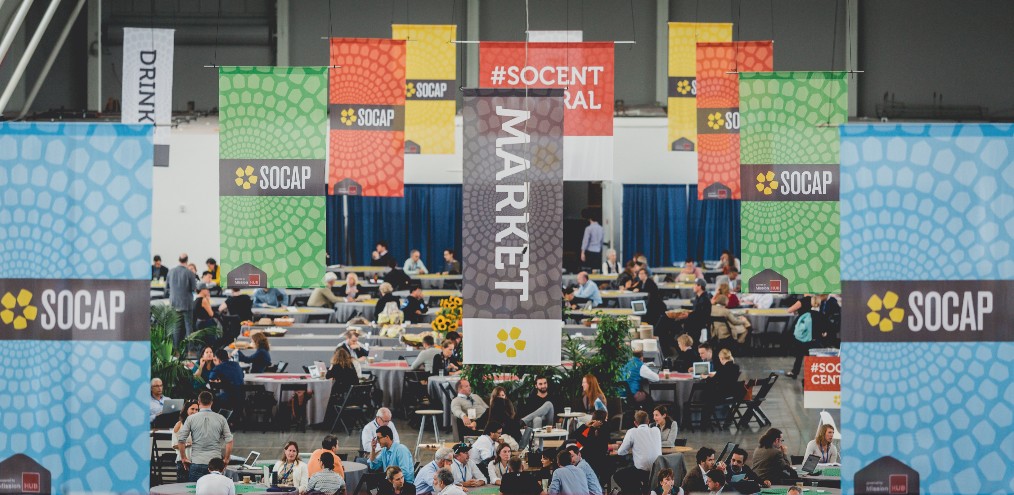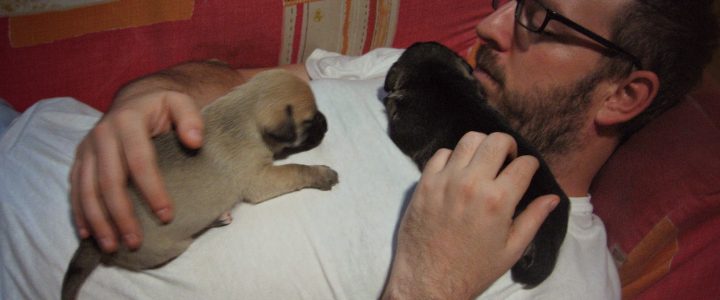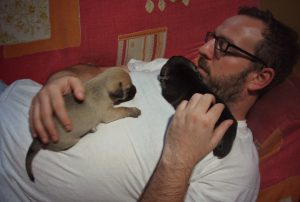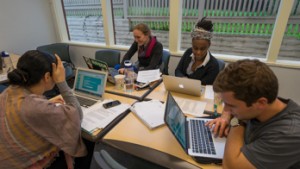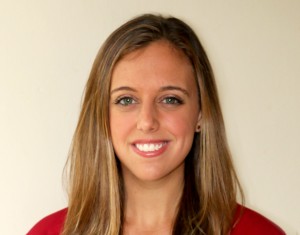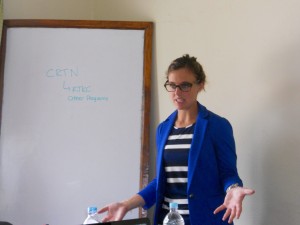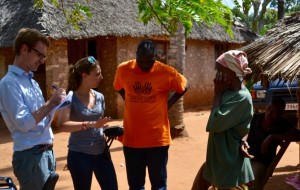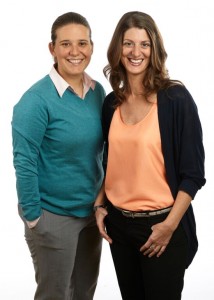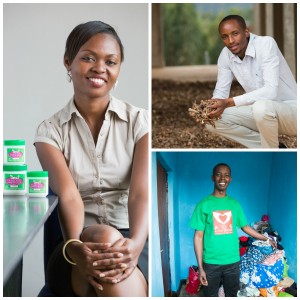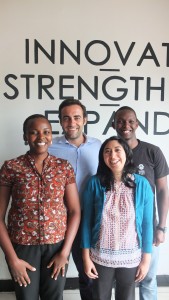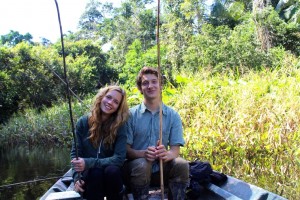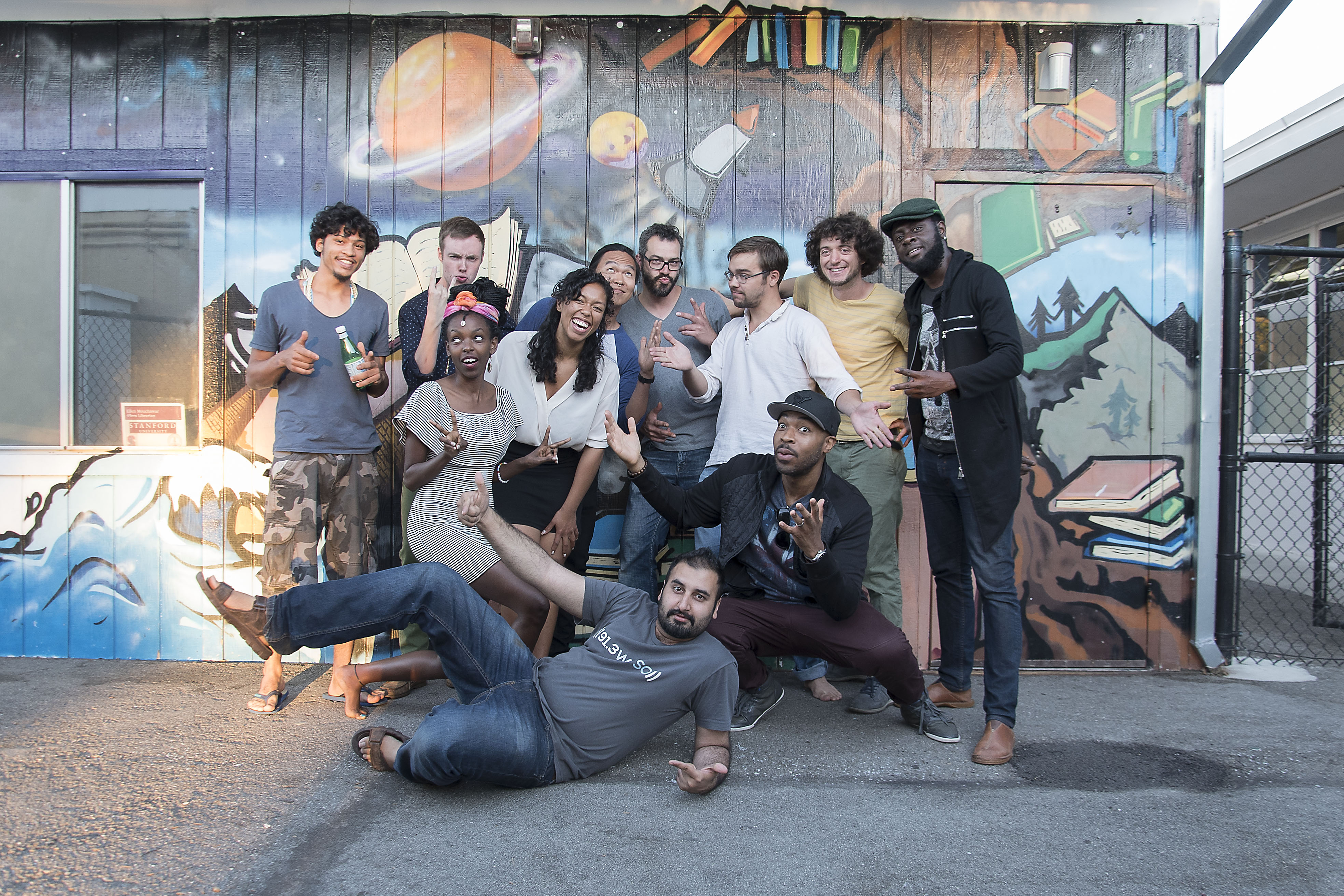 Frontier Market Scouts alum Drew Foxman is the founder and chief creative officer of the organization Giant Steps. The flagship program of Giant Steps is the Music Action Lab—an international platform which brings together musical innovators so that they can collaborate creatively and produce original music and art that to address and advance global social issues. Drew spoke with CSIL’s Outreach Associate, Clare Margason, about the connection between music and impact, and the potential for social entrepreneurs to utilize music as a vehicle for social change.
Frontier Market Scouts alum Drew Foxman is the founder and chief creative officer of the organization Giant Steps. The flagship program of Giant Steps is the Music Action Lab—an international platform which brings together musical innovators so that they can collaborate creatively and produce original music and art that to address and advance global social issues. Drew spoke with CSIL’s Outreach Associate, Clare Margason, about the connection between music and impact, and the potential for social entrepreneurs to utilize music as a vehicle for social change.
Please describe yourself/background.
I grew up in a jazz family. My dad is a scientist, but, outside of his professional life he had over 12,000 jazz albums, and contributed to a lot of publications. These were classic records that came before bebop. I was raised with these incredible jazz musicians, but over time I began to reject that world. I started playing sports and got really into hip-hop, reggae, and rock music. However, my sophomore year of college I had the opportunity to study abroad in Paris and this is when things started to shift. While I was there, a friend of mine introduced me to John Coltrane’s album “Giant Steps,” and it was like I was hearing jazz music for the first time. From that point forward, jazz became a fundamental part of my life.
Besides the time I dedicated to studies and immersing myself in French culture, I listened to as much jazz as possible. I even met John Coltrane’s son and had the chance to work with him. When I finished my undergrad, I had very little direction other than my love of music, culture, and travel. I tried working as a musician, but then shifted to the tech world in order to pay the bills. Serendepitously, that didn’t pan out, but it funded a year abroad where I split my time playing music in Europe and doing volunteer development work on the Tibetan plateau.
When I returned to California, I was connected to the San Francisco Jazz Festival right after they had decided to become a non-profit, now called SFJAZZ. They set up an education department, and I was hired as the third employee. I had a rare opportunity to build out the community development through a variety of outreach and education programs, working with everyone from privileged, talented, and high-performing young musicians, and also with at-risk youth in the violent neighborhoods of San Francisco.
Tell us about your current work/position?
I decided to launch Giant Steps with the concept that is closest to my heart.
To me, the Music Action Lab is about creating a new global musical language that challenges and inspires, and works to address and advance global social justice.
In the Spring of 2017, we will release our debut album, “Foundation.” It is perfectly titled because we focused our first year on laying the necessary foundation for doing social justice work in the first place. Without this groundwork, social justice wouldn’t be able to take place. In the future, the albums and curricula that come out of the Music Action Labs could be about refugees, immigration, or other pressing issues. We will work to build a catalog of Social Action Recordings, and every album will have a specially designed curriculum that goes along with it. Giant Steps has the vision of creating a new global music genre dedicated to advancing social justice and a whole generation of musical social entrepreneurs and activists. During the Lab, they incubate their work with Music Action Projects (MAPs), social action projects that they take home to their communities and are supported by Giant Steps. People may come in as fellows and musicians, but they walk away as artistic changemakers. Take the example of one of our current members Derek Beckvold, a conservatory-trained saxophonist who spent the last four years doing music reconciliation work in Afghanistan, Iraq, Lebanon, Palestine, Sudan, and Sri Lanka. Since joining Giant Steps, he has been heading education programs at the Boston Philharmonic and has launched his own MAP called Teach to Learn, a free video-based music lesson initiative connecting talented instructors from the western world to learners in the developing world.
What is social impact to you? How did you first realize the potential for social innovation and music to collide?
There is an undeniable connection between music and impact. Historically, slavery, oppression, forced migration, all played a prominent role in music’s evolution and in fact led to many of the western world’s music genres, especially jazz and reggae. Music has also been a huge catalyst in all the human rights movements—whether it’s the civil rights movement in the US, apartheid, the fall of the Eastern Bloc, or the Arab Spring.
For me, I was really interested in creating and expanding movements with music. While there is such a thing as “music for good” it’s not yet a sector or field; it’s just a collection of rather disparate practices. Some of these practices are very effective and some of them are not. A lot of these practices come from the music industry, which means there is a lot of scope and opportunity for impact-led initiatives in music.
I liken this to the creation of SOCAP. Yes, it’s a conference, but it was designed to take this disparate field of impact investment and develop a platform for knowledge sharing and ideation in a meaningful and collaborative way. This is the ultimate vision for Giant Steps—building an infrastructure for “social impact music.”
Finally, a story. I was in Visitacion Valley during a time when a lot of murders were happening. We were working at a school on a project that combined the concepts of jazz and language arts, and one student used the project to express what it was like to stand over his brother’s grave. Everyone that was there could see the power of music for the healing process after a traumatic event, and for sharing deep personal stories.
What inspired you to work in the impact space?
On the one hand I think that music is such a powerful tool that is being underutilized. Half the time artists don’t make money to support themselves, even with so much consumption of music happening all over the world. There is huge potential for making a contribution through this vehicle which is completely overlooked in the impact space. There really aren’t many people working on this, and I want to change that.
On the other side of the coin, we have to look to the current political landscape in this county. We are seeing our leadership undermine the core values that, in my opinion, are what define humanity. If we were successful in embracing and progressing certain value systems, things like human trafficking, the conflict in Syria, and so many other crises and intractable problems wouldn’t be happening.
In response to these global phenomena, we have large scale, multi-lateral, target setting entities that are attempting to solve problems by a certain date. It sounds nice and gives people motivation and hope, but clearly the periodic re-setting of these targets mean we are stuck on a kind of “poverty alleviation treadmill.” If the folks behind the biggest networks of money and aid are only making marginal improvements, it seems we as a collective community need more creative and innovative approaches. So, I say, let’s look at these issues through a different lens.
Let’s use music, a tool that has now been scientifically proven to have positive impacts on our neurological, as well as psycho-social development.
Who has been particularly inspiring to you?
John Coltrane, the Dalai Lama, Bob Marley, Bill Belichik are a few that come to mind immediately. However, over the years I’ve had to build a lot of inspiration myself because I haven’t benefited from long term mentors. I’ve been fortunate to have some great mentors take me under their wing, but the majority of those relationships were transient. I feel like I’ve drawn most inspiration out of experiences that I’ve designed for myself. For example, when I wanted to learn about Tibetan Buddhism, I just went to Tibet and did it. The same goes for music.
I do recall an experience that was particularly inspiring to me. I was in the field with the American India Foundation. This was in western Orissa—a landlocked and very impoverished area in India. We were doing site visits and I remember being so moved by the continuous stream of music that greeted us wherever we went. The music was non-stop. It was multi-generational. And, it seemed like the music was part of the reason that people were so opening and welcoming. I’ve never seen or heard anything like it. Music ever-present, and with so much warmth and acceptance. I’m sure that experience helped me along the path to starting Giant Steps.
How would you describe your FMS experience?
Every year I try to do something intentional for my professional development. My choice in 2016 was Frontier Market Scouts. First, the focus on social enterprise was very attractive as I was close to launching Giant Steps. And I didn’t know much about impact investment, and felt that this would help build out my knowledge of the social sector. I guess you could say that I’ve become a generalist overtime. I’ve worn many different hats working as the director of marketing, development, programming, but I didn’t necessarily have a specialization. This is probably due to the fact that I am constantly yearning to create new things and to keep moving. I always want to learn new skills and hope to never stop being innovative and creative.
I really thought both aspects of the program, the instructors and their curriculum, as well as the cohort, were very valuable. The cohort was outstanding. It was representative of multiple backgrounds and experiences. One person had been running USAID projects for 20 years, there were graduate students with experience on every continent, I could go on and on. Additionally, everyone helped build a really supportive community. I liked how open people were, and how willing they were to learn from each other. I felt like the FMS was a microcosm of what development and impact work should be like.
During the FMS training, I connected with our first instructor, Morgan Simon. She is the founder of multiple organizations such as the Responsible Endowments Coalition, Toniic, and Transform Finance. I needed to complete my fellowship with Morgan’s firm, Pi Investments. I was actually able to use some of the financing from this work to launch Giant Steps!
Note to reader: Wondering how you can be involved? Giant Steps is raising funds for the 2017 Music Action Lab. You can learn more and support their work here. Applications will go live in Spring 2017. Like them on Facebook and visit the website to learn more.




